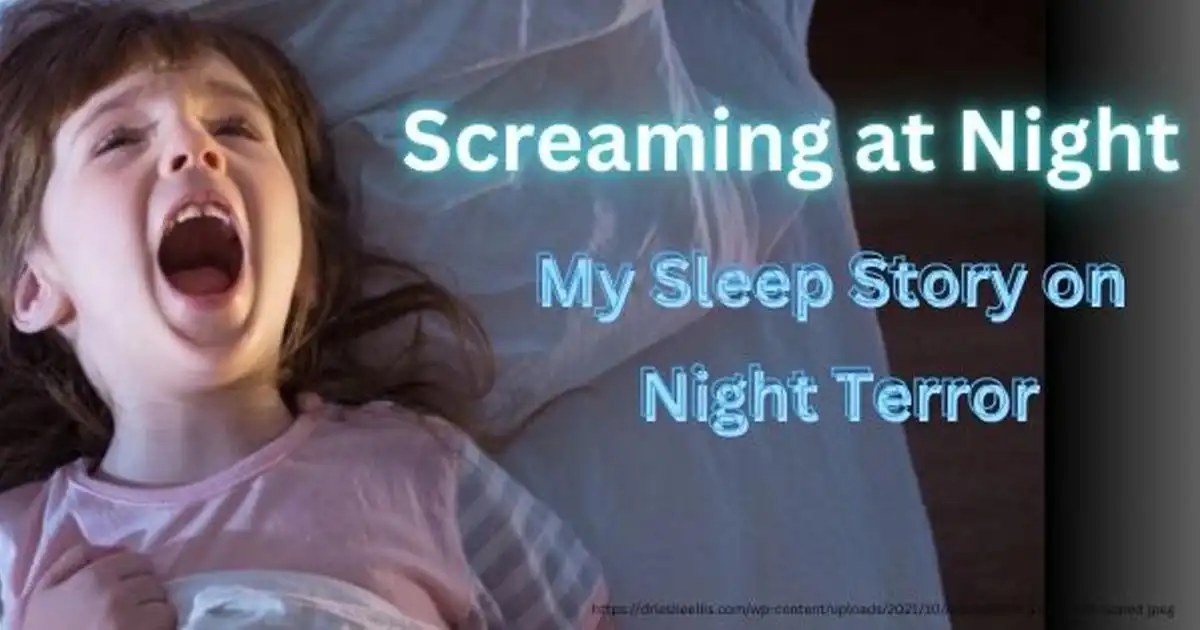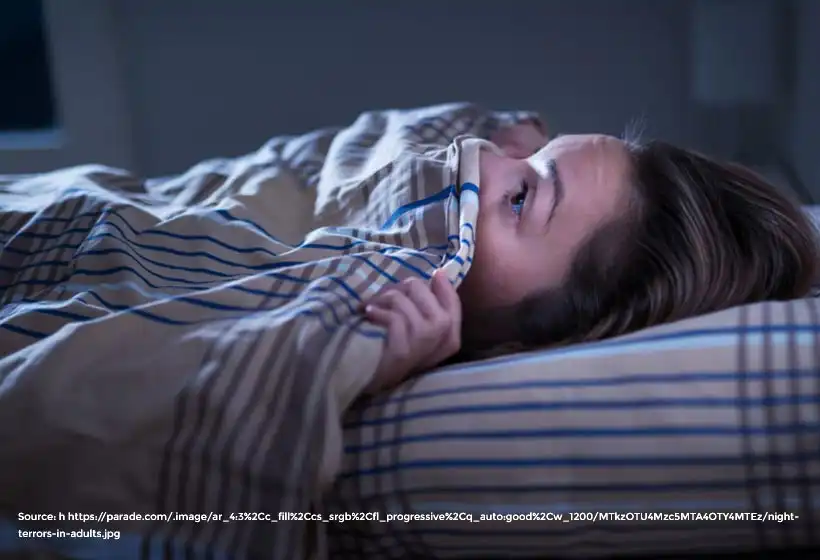Screaming at Night: My Sleep Story on Night Terror

Aaaah! The chilling scream pierces the silent night.
It shatters the calm like a ghostly wail from the shadows. My heart was racing. I was drenched in sweat. But it wasn’t I who screamed. It was someone else. Trapped in a terror too real to escape.
Night terrors! Haunted episodes that drag me into a world of fear. It can turn a peaceful sleep into a ghostly nightmare.
Imagine the helplessness of hearing someone scream. What is it like to be lost in a night terror? Why do they evoke such uncontrollable fear?
Let’s explore!
What are Night Terrors?
Night terrors are episodes of intense fear. They often involve confusion, increased heart rate, and difficulty waking up. These episodes usually occur during deep non-REM sleep. It occurs specifically during the first third of the night.
Night terrors are more common in children. However, adults can experience them too. The person experiencing a night terror may sit up, scream, or even appear awake. However, they are still asleep. They usually have no memory of the event when they wake up.
Night Terrors vs. Nightmares: What’s the Difference?
Many people confuse night terrors with nightmares. However, they are different phenomena. Here’s a quick comparison:
- Nightmares: Occur during REM sleep. It typically involves distressing dreams. The person can often recall them upon waking.
- Night Terrors: Occur during non-REM sleep. It involves intense fear without a clear dream narrative. The person usually does not remember the episode.
Night terrors tend to be more physically disruptive. Nightmares are mentally disturbing. Both can cause poor sleep quality. Even so, night terrors tend to involve more pronounced physical symptoms. It includes rapid breathing, increased heart rate, and sweating.
Curious to know more about types of sleep disorders? Read now!
The exact cause of night terrors isn’t fully understood. There are several factors that are believed to contribute. They are more common in children. Adults can also experience them.
Have a look!
Causes of Night Terrors
1. Genetic Factors
Night terrors may have a genetic component. Children whose parents experienced night terrors or sleepwalking are more likely to have similar episodes. This points to a possible hereditary link in some cases.
2. Sleep Deprivation and Fatigue
A lack of sufficient sleep or disrupted sleep patterns is one of the most common triggers. Sleep deprivation can lead to deeper, more prolonged stages of non-REM sleep. It increases the likelihood of a night terror episode.
3. Stress and Anxiety
Emotional stress and anxiety can be significant contributors to night terrors. High stress levels can impact sleep quality. For some individuals, this can manifest as night terrors. Stressors in daily life, including personal, academic, or professional pressures, can disrupt sleep patterns.
4. Fever and Illness
Children experiencing fevers or illnesses are more prone to night terrors. The body’s response to fever can disrupt normal sleep cycles. It makes night terrors more likely.
5. Medications
Certain medications can influence sleep patterns and trigger night terrors. It includes those affecting the central nervous system like antidepressants or antipsychotics. This is more common in adults than in children.
6. Sleep Disorders
Other sleep disorders like sleep apnea or restless leg syndrome can also contribute to night terrors. These conditions disrupt normal sleep patterns. It can lead to frequent awakenings. This may increase the likelihood of a night terror episode.
Do you have sleep apnea? Know the right mattress!
7. Environmental Factors
Sleeping in unfamiliar surroundings, loud noises, or bright lights can disturb sleep. It triggers night terrors. Even changes in room temperature can sometimes influence sleep cycles. It provokes the episodes.
Symptoms of Night Terrors
Night terrors are marked by several distinct symptoms. Some of which can be alarming to those witnessing an episode. However, it’s important to remember that the person experiencing a night terror is generally unaware of the situation. They do not remember it upon waking.
Common Symptoms Include:
- Screaming or shouting
- Sitting up in bed
- Rapid breathing and elevated heart rate
- Sweating
- Wide-eyed expression or staring blankly
- Thrashing, kicking, or moving violently
- No memory of the event the next day
During a night terror, the person might appear to be awake. They are still asleep. They are often unresponsive to attempts to calm them down. While the episode typically lasts only a few minutes, it can be distressing for those nearby.
Night Terrors in Children

Night terrors are most common in children. It occurs particularly between the ages of 3 and 7. For parents, it can be extremely unsettling to witness their child having an episode. The child may scream, appear frightened, or thrash about violently.
Why Are Children More Prone to Night Terrors?
Children’s sleep patterns differ from those of adults. It includes longer periods of non-REM sleep in the early part of the night. This is when night terrors usually occur.
Furthermore, children’s brains may have more difficulty transitioning between sleep stages. It makes them more susceptible to sleep disruptions like night terrors.
How Should Parents Handle Night Terrors?
The best approach is often to avoid trying to wake the child during an episode. This can sometimes cause confusion and prolong the event.
Instead:
- Ensure their safety: Remove any objects or items that could cause harm if the child thrashes about.
- Remain calm: Children are often unaware of their night terrors. It is more distressing for the parents than for the child.
- Let it pass naturally: Most night terror episodes will resolve themselves within 10 to 15 minutes.
If night terrors are frequent or severely disruptive, consult a healthcare provider. In some cases, cognitive-behavioral therapy (CBT) can help.
Night Terrors in Adults
Night terrors can also occur in adults. When they do, they are often associated with other underlying conditions or stressors.
Triggers for Night Terrors in Adults
Stress and Anxiety
- Emotional and psychological stress plays a major role in adult night terrors.
- Work pressures, relationship issues, or significant life changes can all be triggers.
Alcohol and Substance Use
- Excessive alcohol consumption or the use of recreational drugs can disrupt sleep patterns.
- It increases the likelihood of night terrors.
Sleep Disorders
- Adults with untreated sleep disorders like sleep apnea.
- They may be more prone to night terrors.
Mental Health Disorders:
- Night terrors can also be linked to mental health conditions.
- It includes depression, post-traumatic stress disorder (PTSD), or generalized anxiety disorder (GAD).
Managing Night Terrors in Adults
Managing night terrors in adults often requires addressing the underlying triggers. Strategies might include:
- Stress management techniques: Practicing relaxation exercises like yoga or meditation can reduce anxiety and improve sleep quality.
- Regular sleep schedule: Establishing consistent sleep habits can help regulate sleep cycles.
- Avoiding alcohol or stimulants: Reducing or eliminating alcohol and other substances that can disrupt sleep may minimize night terror episodes.
- Seeking professional help: If night terrors are linked to mental health disorders or significant stress, therapy or counseling may be beneficial.
Night terrors are typically diagnosed based on a description of the symptoms. It depends on an evaluation of the individual’s medical history. Hence, proper diagnosis is required.
Diagnosing Night Terrors

Sleep Study (Polysomnography)
A sleep study, or polysomnography, involves monitoring a person’s brain waves. It monitors heart rate, breathing patterns, and body movements during sleep. This can help identify if there are any disruptions in sleep stages. It can recognize sleep apnea.
Treatment Options for Night Terrors
Night terrors often don’t require medical treatment, especially in children. They tend to resolve on their own as the child grows older. However, if night terrors are frequent or disruptive, there are various treatment options available.
1. Cognitive Behavioral Therapy (CBT)
- CBT is a type of therapy that can help individuals manage stress and anxiety. Stress and anxiety are common triggers for night terrors.
- CBT can help people develop healthier coping mechanisms for managing stress. This in turn can improve sleep quality.
2. Scheduled Awakenings
- Scheduled awakenings can help prevent night terrors, particularly in children.
- This technique involves waking the individual about 15 to 30 minutes before the time they typically experience a night terror.
- This can help disrupt the sleep cycle and prevent the episode from occurring.
3. Medication
- In some cases, particularly for adults, medication may be prescribed to help manage night terrors.
- These may include antidepressants or benzodiazepines. It can help regulate sleep patterns and reduce the likelihood of night terrors.
- However, medications are usually a last resort. It is only recommended when other interventions have not been effective.
4. Improving Sleep Hygiene
- Maintaining a consistent bedtime routine and creating a comfortable sleep environment can improve sleep quality.
- It can reduce the frequency of night terrors.
Some tips include:
- Establish a consistent sleep schedule: Go to bed and wake up at the same time every day, even on weekends.
- Create a relaxing bedtime routine: Engage in calming activities before bed, such as reading, listening to soft music, or practicing deep breathing exercises.
- Limit screen time: Avoid using electronic devices before bed, as the blue light can interfere with the production of melatonin, a hormone that regulates sleep.
- Keep the bedroom dark and cool: A comfortable sleep environment can help promote deeper, uninterrupted sleep.
When to See a Doctor?
Night terrors are usually not a cause for concern, especially in children. However, you should consider seeking medical advice if:
- Night terrors occur frequently (more than once a week).
- Episodes cause injury to the person or others.
- The person is excessively tired during the day.
- Night terrors continue beyond adolescence.
- There are underlying health conditions or other sleep disorders.
As the moon crept higher, my nights became haunted. I screamed echoing through the shadows. My sleep became a battlefield. I fight against an invisible terror each night.
Night after night, I battled these invisible specters. No memory to hold onto, only the whispers. Night terrors are not mere nightmares, they are the unseen phantoms of the night.
So, next time you find yourself screaming at night, remember sometimes the real horror lies within your dreams.
And once the terror finds you…it never really leaves.
FAQs on Night Terror
- Why am I experiencing night terrors?
Night terrors are common in children and are often linked to separation anxiety. However, adults aren’t immune. Those with post-traumatic stress disorder (PTSD) or mood disorders may be more prone to night terrors. It is due to heightened stress and emotional triggers during sleep.
- What type of trauma can lead to night terrors?
Night terrors are often triggered by trauma. Post-traumatic stress disorder (PTSD) is a common cause. Those affected may experience intense sleep disruptions. Supporting a loved one in finding appropriate treatment for PTSD can help alleviate these symptoms.
- What are the night terror medications?
Medications are rarely used to treat night terrors, even in adults. However, if episodes are frequent or severe, consult a doctor. Your doctor may prescribe benzodiazepines, selective serotonin reuptake inhibitors (SSRIs), or tricyclic antidepressants.
- Can night terrors affect relationships?
Absolutely. The night terrors can create stress in relationships. This is especially true with partners who share a bed. The disruptive nature of episodes may lead to emotional strain. Open communication about night terrors can help ease the tension.
- Can night terrors be triggered by specific sounds or smells?
Yes, certain sensory inputs like loud noises or a familiar smell can trigger night terrors. These stimuli may disrupt the transition between sleep cycles. It’s a good idea to create a calming sleep environment.
Disclaimer
This content is for informational purposes only. It is not intended as medical advice. Always consult a healthcare professional for diagnosis and treatment of night terrors.
